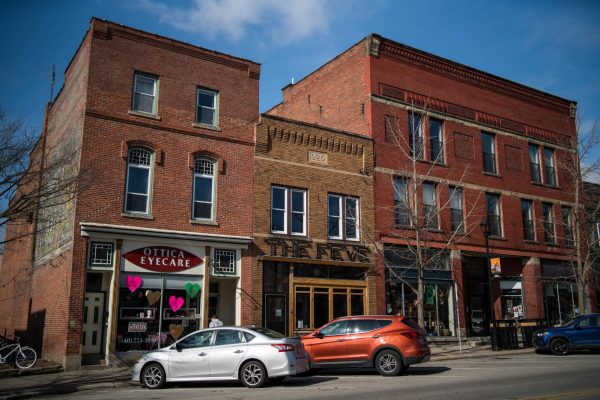CCL Fights For Climate Change Policies
Ray English, Emeritus Director of Libraries at Oberlin College and a member of Oberlin’s branch of Citizens’ Climate Lobby, joined 619 other volunteers from CCL in Washington, D.C. on Monday, Nov. 19, to advocate for bipartisan climate policies. The volunteers participated in over 400 congressional meetings and met with numerous Ohio representatives.
Citizens Climate Lobby is a national environmental group which works to educate communities on how to engage with their representatives about Climate Change.
“I visited four different congressional offices with teams from the lobby, and we had a very good conversation with Senate and House offices,” English said. “We met with offices of Senator Portman, a Republican senator from Ohio, Senator Brown, who is a Democratic senator, and the office of Jim Jordan, who is in the House of Representatives — he is our local congressman — and also with the office of representative Bob Gibbs — he was in the adjacent district.”
Climate change policy is often perceived as a Democratic priority. However, English hopes that climate change will become a bipartisan issue.
“It’s become quite partisan as an issue with very sharp opinions from both sides,” English said. “The problem with a divisive issue is that the parties may just continue to fight over the issue but never find a solution and that is exactly what has happened with climate change … and the solution we are proposing is one which we think is attractive to both parties. We are arguing in a sense of encouraging that both our parties stop the political fighting and come together on an effective solution.”
John Sabin, the founder of the local chapter of the CCL in Oberlin, noted that the city of Oberlin has asked Congress to enact better climate change policies previously.
“I think our biggest accomplishment so far is that we worked with Oberlin City Council, and a year after we launched — it was March of 2018 — the Oberlin City Council passed a resolution calling on Congress to implement our climate action proposal called Carbon Fee and Dividend,” Sabin said.
According to English, the Carbon Fee and Dividend policy can help both the American economy and the climate.
“We favor an approach that basically would place a fee on carbon at the source, that is oil, natural gas, and coal,” English said. “That fee would steadily rise each year following that, but all the money that comes in from the fee would be given back to American households on an equal basis; so, it’s basically creating market incentives to transition to a clean energy economy.
For English, Carbon Fee and Dividend is the optimal approach that the CCL should use to attract bipartisan efforts.
“It would grow the economy, it would create market growth, it’s revenue-neutral, and it would have health benefits for the American people — it would be positive in many different ways,” English said. “And what I particularly like about it is that it would not be damaging to low-income people.”
The CCL is already seeing some increases in bipartisan climate change efforts. On Tuesday, Nov. 27, The Energy Innovation and Carbon Dividend Act, a bipartisan bill, was introduced to the House of Representatives.
“[The Act] has been the most significant climate change legislation Congress has seen in over a decade,” Sabin wrote in an email to the Review. “It is almost identical to the proposal Citizens’ Climate Lobby has been promoting for years.”
In February of this year, a student chapter of the CCL was formed at Oberlin College.
“We kind of work independently and codependently, so we have our own projects that we work on, such as getting an endorsement from Oberlin Committee on Environmental Sustainability — so I got that back in May, and then another project that we are working on is an endorsement from President Ambar,” said chapter founder and College sophomore Jess Wilber.
English hopes that more Oberlin students become involved with the CCL, and he urges students to join their local chapter and attend monthly meetings. Additionally, he also urges students to advocate for climate change policy in alternative ways.
“The Citizens’ Climate Lobby is trying to create, at a national level, a political will to solve the problem of Climate Change, and that involves a lot of local efforts … [such as] writing to the newspaper, or going to public events [and] tables, and talking to citizens, talking with people in a position of influence…” English said.






